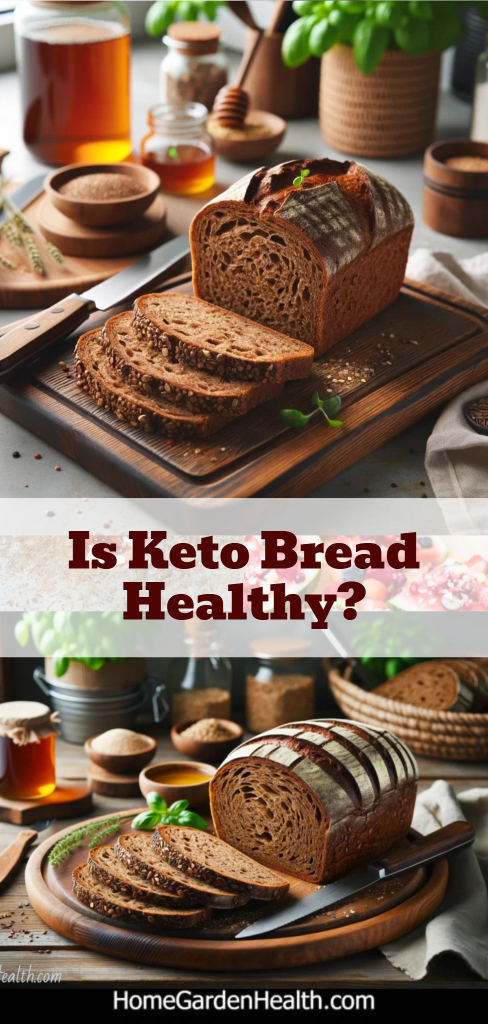
Having a growing family I am always on the lookout for healthier food options, I’ve been learning a lot about keto bread lately. It’s become a staple for many in the low-carb and keto community, and as someone who loves her sandwiches but is mindful about health, I had to dig deeper. So, dive in and find out – is keto bread really a healthy choice?
What is Keto Bread?
Keto bread is like the holy grail for those on a ketogenic diet. It’s designed to be low in carbs and high in fats, aligning perfectly with the keto philosophy. Traditional bread, which is high in carbohydrates, can be a no-go on a keto diet, so keto bread uses substitutes like almond flour or coconut flour instead of wheat flour. But the question remains: “Is Keto Bread Healthy?”
Nutritional Profile of Keto Bread
To understand if keto bread is healthy, let’s look at what’s inside. Keto bread is typically lower in carbs and higher in protein and fats. For instance, while a slice of white bread might have about 14 grams of carbs, a slice of keto bread could have as little as 1-3 grams. It’s often packed with fiber (thanks to ingredients like psyllium husk) and healthy fats (from sources like almond flour).
My advice is always check the label! Some keto breads can have additives or artificial ingredients to enhance flavor or texture, which might not be what you want for you or your family.

Benefits of Keto Bread
- Low Carb Content: One of the most significant advantages of keto bread is its low carbohydrate content. This makes it an excellent choice for those following a ketogenic diet or anyone trying to reduce their carb intake. Lower carbs can help maintain steady blood sugar levels, which is particularly beneficial for individuals with diabetes or insulin resistance.
- Weight Loss Friendly: Due to its low carb and higher protein content, keto bread can be an ally in weight management. Protein is more satiating, which means it can help you feel full longer, potentially reducing overall calorie intake. This can be particularly beneficial for busy people who don’t always have time to prepare frequent meals but still want to maintain a healthy weight.
- Blood Sugar Management: Keto bread’s low carbohydrate content means it has a minimal impact on blood sugar levels. This is crucial for maintaining energy levels and mood, especially important for moms like myself who need to keep up with their kids all day. Stable blood sugar levels can prevent the highs and lows often experienced after eating high-carb foods.
- High in Fiber: Many keto breads are high in fiber due to ingredients like nuts, seeds, and coconut flour. Fiber is essential for digestive health, helping to prevent constipation and promote a healthy gut. A high-fiber diet can also contribute to heart health by helping to lower cholesterol levels.
- Nutrient-Dense: Keto bread often contains nutrient-dense ingredients like almonds, flaxseed, and eggs, providing essential vitamins and minerals. These nutrients support overall health, including skin, hair, and nail health, which is something I really appreciate.
- Gluten-Free Options: Many keto breads are naturally gluten-free, making them a great choice for those with gluten intolerance or celiac disease. This is a significant pro for families who need to cater to different dietary needs but still want to enjoy bread.
- Keto-Friendly: For those strictly adhering to the ketogenic diet, finding bread that fits into this lifestyle can be challenging. Keto bread offers a solution, allowing you to enjoy sandwiches and toast without breaking your carb limit.
- Versatility in Recipes: Keto bread is not just for sandwiches. Its unique texture and flavor profile make it suitable for various recipes, from French toast to breadcrumbs for coating. This versatility is a big plus, it makes it easy for me to add variety to family meals without compromising on health.

Negatives of Keto Bread
- Artificial Ingredients and Additives: While keto bread is a low-carb alternative, some brands may include artificial ingredients or additives to improve taste and texture. These can include emulsifiers, preservatives, or artificial sweeteners. It’s essential to read labels carefully, especially if you’re aiming for a diet that’s as natural and unprocessed as possible.
- Higher Cost: Keto bread often comes with a higher price tag compared to regular bread. This is due to the cost of alternative ingredients like almond flour and coconut flour, which are more expensive than traditional wheat flour. For families and individuals on a budget, this can be a significant downside.
- Taste and Texture Differences: If you’re used to traditional wheat bread, keto bread can be an acquired taste. It tends to be denser and moister, which might not appeal to everyone. Kids, especially, might be more discerning about these differences. It can take some trial and error to find a brand or recipe that pleases everyone’s palate.
- Nutritional Deficiencies: While keto bread is low in carbs, it can also lack some of the nutrients found in whole grain bread, such as certain B vitamins and fiber. This is particularly important if you’re using keto bread as a complete substitute for traditional bread.
- Digestive Issues for Some: Ingredients commonly used in keto bread, like almond flour and coconut flour, are high in fiber and fat, which can cause digestive discomfort in some people, especially those not used to high-fiber diets.
- Allergen Concerns: Keto bread often contains nuts and eggs, common allergens. This can be a significant concern for families with nut or egg allergies, limiting the suitability of keto bread as a bread alternative in such households.
- Not Suitable for All Diets: While keto bread is perfect for a ketogenic diet, it may not align with other dietary preferences or restrictions. For instance, vegan diets may not be compatible with keto bread recipes that use eggs or dairy products.
- Limited Availability: Depending on where you live, keto bread might not be readily available in your local grocery stores. This can be inconvenient, especially if you’re not into baking your own bread at home.
- Overconsumption Risks: Just because it’s labeled “keto” doesn’t mean it’s a free pass to eat without limits. Overconsumption of keto bread can still lead to excessive calorie intake, which may impact weight management goals.
Make Your Own Keto Bread!

For those who love to bake or are concerned about the additives and cost of store-bought keto bread, making your own can be a rewarding and healthier alternative. Here’s why you might consider it:
- Control Over Ingredients: When you bake your own keto bread, you have complete control over what goes into it. This means you can avoid any artificial additives, preservatives, or allergens that might be present in commercial brands. You can choose organic, non-GMO, or specific types of ingredients according to your dietary preferences.
- Customization: Homemade keto bread allows for customization. Don’t like the taste of almond flour? Substitute it with coconut flour or flaxseed meal. You can add herbs, seeds, or nuts to suit your taste preferences and add nutritional value.
- Cost-Effective: In the long run, making keto bread at home can be more cost-effective than buying it. While the initial purchase of ingredients like almond flour or xanthan gum might seem expensive, they last for several batches, reducing the cost per loaf.
- Freshness and Flavor: There’s nothing like the taste of freshly baked bread. Homemade keto bread doesn’t contain preservatives, which means it’s fresher and potentially more flavorful than store-bought varieties.
- A Fun Family Activity: Baking keto bread at home can be a fun and educational activity for the whole family. It’s an excellent opportunity for kids to learn about healthier eating and the joy of baking.
- Satisfaction of DIY: There’s a unique satisfaction that comes with making your own bread. It’s a rewarding process to see simple ingredients transform into a delicious loaf that fits your dietary needs.
Simple Keto Bread Recipe:
Here’s a basic recipe to get you started:
- Ingredients: 2 cups almond flour, 1/4 cup psyllium husk powder, 2 tsp baking powder, 1/2 tsp salt, 4 large eggs, 1/4 cup melted coconut oil, 1/2 cup warm water.
- Instructions:
- Preheat your oven to 350°F (175°C).
- Mix the dry ingredients in one bowl and the wet in another. Combine them and mix until you have a dough.
- Place in a loaf pan lined with parchment paper.
- Bake for about 45-50 minutes or until a toothpick comes out clean.
- Let it cool before slicing.
Remember, this is just a starting point! Feel free to experiment and make it your own.
Want to avoid the keto flu? click here
FAQs
Absolutely, due to its low carb content. But remember, moderation is key!
Sure, but variety is important in any diet. Don’t rely solely on keto bread for your nutritional needs.
It’s different, but not in a bad way. Think of it as a new taste adventure!
Keto bread is typically high in healthy fats, which can be beneficial for cholesterol. However, if it contains saturated fats from sources like coconut oil, it’s wise to consume it in moderation.
Due to its low carb content, keto bread can help in managing blood sugar levels, which is beneficial for those with type 2 diabetes. However, individual responses may vary, so it’s important to monitor blood sugar levels regularly.
Homemade keto bread can be healthier as it allows you to avoid preservatives and artificial ingredients. You also have the flexibility to include ingredients that suit your dietary preferences and health goals.
Final Thoughts
I often use intermittent fasting as my way to stay healthy and keep weight off, but adding keto bread to my healthy lifestyle has been agreat way to break my fast whilst still staying in ketosis for a little longer.
So as to the question “Is Keto Bread Healthy?”, I see keto bread as a useful option, especially for those on a keto diet. It’s not a one-size-fits-all answer, though. It’s about balance and choosing what works best for your dietary needs and taste preferences.
And hey, if you’re curious or have your own experiences with keto bread, drop a comment below! I’d love to hear from you. For more tips on healthy living and diet, don’t forget to subscribe to my newsletter. Keep munching, but mindfully!
References :
https://www.health.harvard.edu/staying-healthy/should-you-try-the-keto-diet
How to Make a Keto Coffee: The Perfect Blend for a Ketogenic Lifestyle


